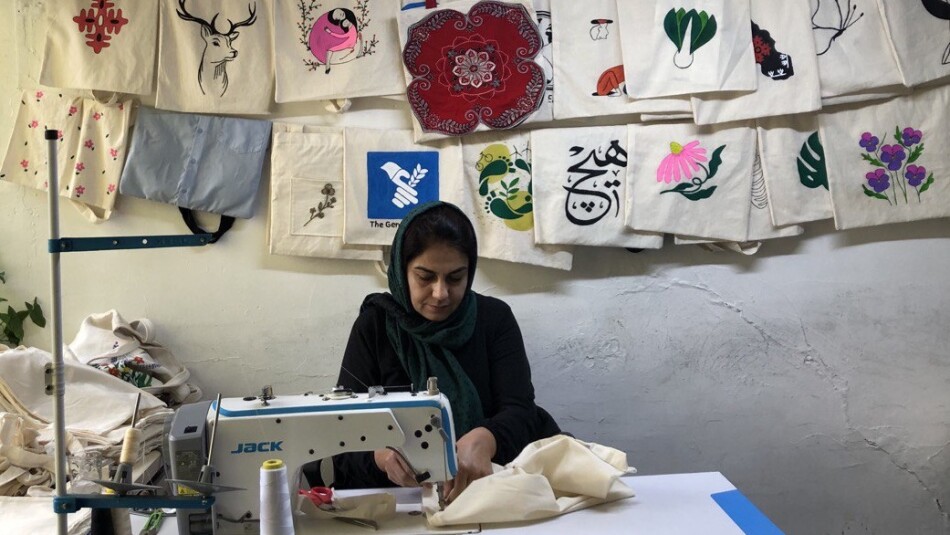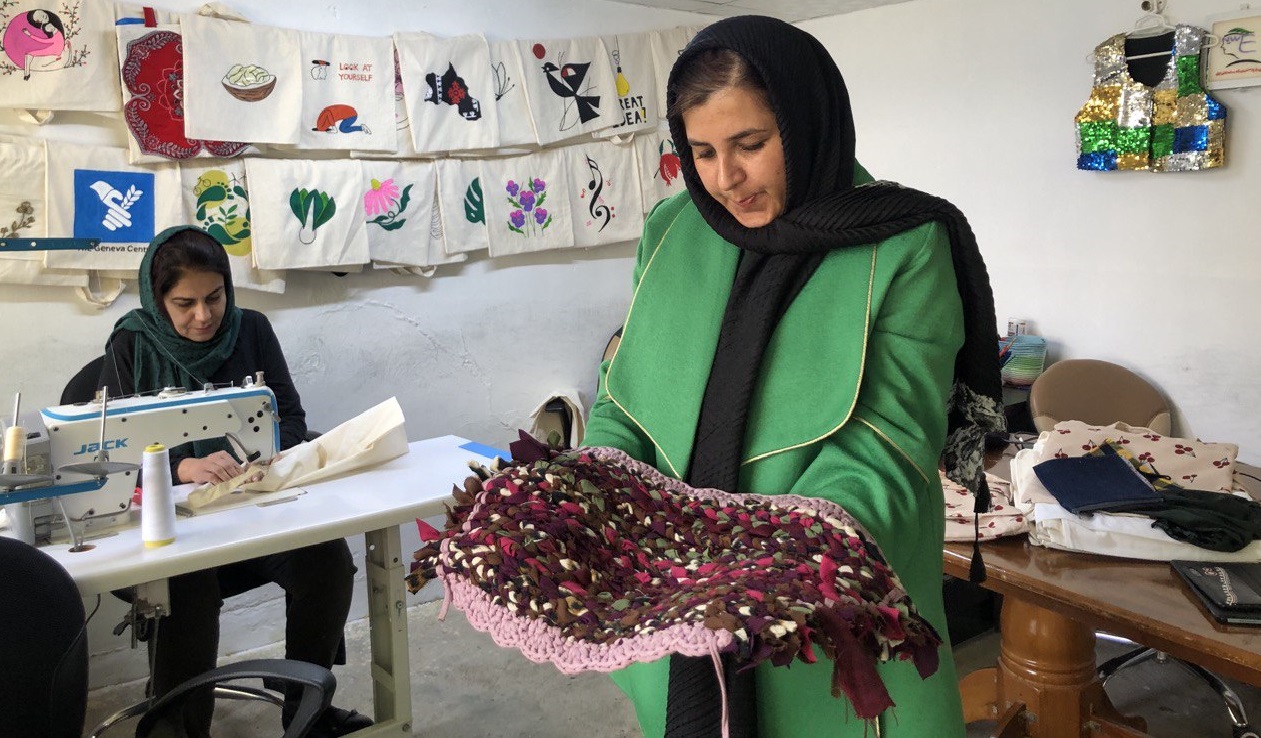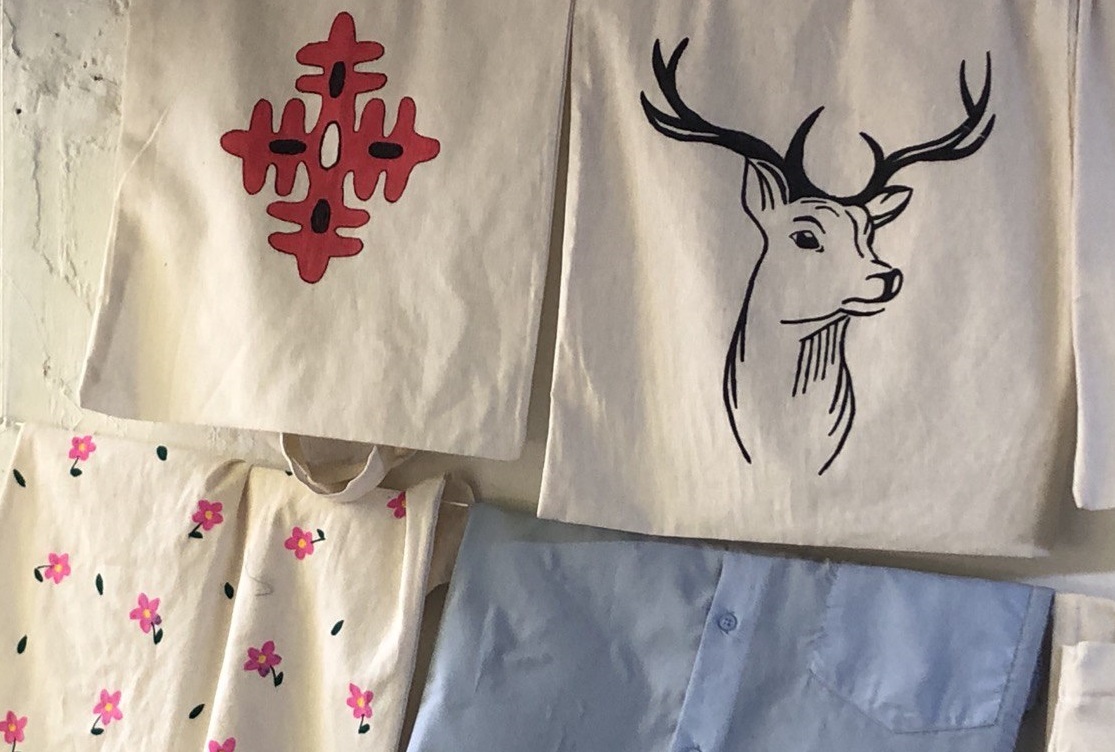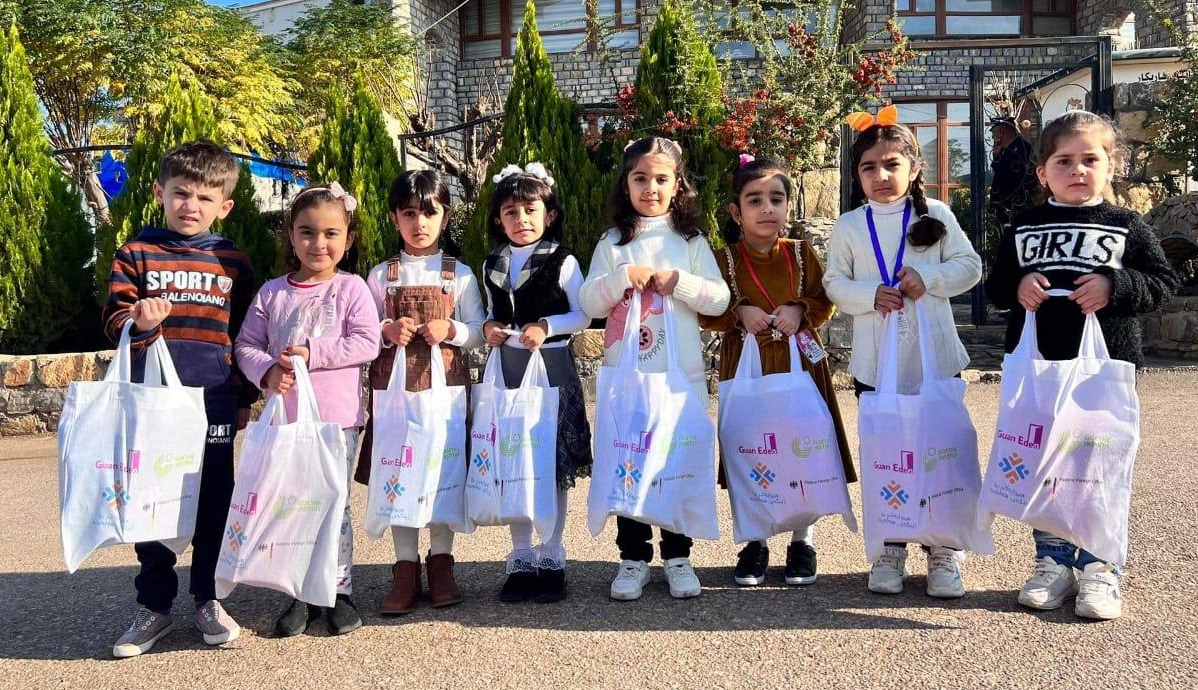
In a four-room building, two of which are filled with used second-hand clothes, cloth bag, and fabric, Ghamgin Kaka Wahab, 48, is protects the environment twice at the same time: making reusable cloth bag to replace plastic bags and turninf used clothes to make other items.
The building is located in a Milli neighborhood of Halabja, on a 250-meter plot of land, which houses Nwe (new) organization.
One of the NGO’s goals is to spread environmental awareness.
Over the past four years, Ghamgin has sewn about 4,000 cloth bags and distributed many of them free of charge as a substitute for plastic bags. As people become more aware of the benefits of using cloth bag instead of plastic bags, the organization aims to earn income.
Plastic, including plastic bags, takes 1,000 years to decompose, according to the United Nations Development Programme UNDP. Improper disposal of plastic causes environmental pollution, which harms marine animals, damages soil, and poisons groundwater, posing risks to human health.
In Halabja province of the Kurdistan Region of Iraq KRI, over 150 tons of garbage are collected daily, including at least 13 tons of plastic waste, including plastic bags, according to statistics from the Halabja Municipality.
The idea originated during the coronavirus era. The organization had received a project in 2020 to sew masks and distribute them for free to people and government offices.
"A group of women participated in making the masks by sewing. We produced 20,000 masks and distributed them for free. Then we thought about how we can serve the environment through these women by making cloth bags to replace plastic bags," Ghamgin said.
"We felt this would be the most environmentally impactful thing we've done because it's an eco-friendly substitute for plastic bags that can be reused many times over," said Hero Wakil, head of Nwe NGO.
According to Ghamgin, they distribute cloth bag for free to offices and individuals in some places to encourage its use instead of plastic bags, but they also sell them.
According to the United Nations Development Programme, more than 430 million tons of plastic are produced annually worldwide, two-thirds of which are short-lived products that become waste and pollute the soil and oceans, directly impacting human food production.
Plastic is present in various products, from nylon, clothing, and packaging to cosmetics. Over 280 million tons of short-lived plastic products are wasted annually worldwide.
In Halabja, where the organization operates, the amount of plastic waste exceeds seven tons per day.

In addition to working to replace plastic bags, the NGO is engaged in another environmentally friendly initiative: reusing clothes to make cloth bags, wallets, and pillow covers from discarded clothes or tailors’ scraps.
"Discarding clothes contributes to environmental pollution, and we aim to prevent it," Ghamgin said.
Cloth bag: higher demand, cleaner environment
Over the past four years, the teams at the Nwe organization have launched an intensive campaign to introduce cloth bag and its environmental benefits to the public.
Husna Hawrami, 34, head of the environmental department at the Nwe organization, stated that they initially started the campaign in places where plastic bags were commonly distributed, such as bakeries, shops, and villages.
"At first, people were skeptical until we explained the numerous benefits. Fortunately, this year, there is a high demand," she said.
Gradually, the design of cloth bag evolved to attract people's attention. For example, Husna, who designs them herself, said, "I decided to paint designs on the cloth bag to make them appealing and popular, especially among young people."
Even in the use of paint, the organization's teams strive to be environmentally friendly. "Sometimes we use natural dyes from roots like beetroot, turmeric, and other sources," she added.
In his three-by-four room, filled with cloth bag, designed fabrics, fabrics, and used clothes, Ghamgin occasionally showcases new pieces such as Kurdish clothes, pillows, wallets, etc., on a large table where she works.
"In four years, I have sewn about 10,000 cloth bags," Ghamgin proudly said. "I typically sew 25 meshes a day. Each cloth bag costs between 500,000 to 750,000 dinars (0,5USD), with discounts available for orders exceeding 100 pieces."
Mihraban Salam, 36, a mother of two, shared that she has been using cloth bag for several years. She uses different types of mesh for various purposes.
"Women appreciate change, and this is a positive change. I try to reduce my use of plastic bags when shopping. Shopkeepers recognize me and no longer offer me plastic bags," Mihraban said.
"I realized that plastic bags are harmful to food and the environment. Sometimes I even use cloth bag instead of a shoulder bag."
Mihraban purchased a bag from the organization made from recycled cotton for 15,000 Iraqi dinars IQD, while a similar bag made from nylon costs 40,000 IQD. She mentioned buying cloth bags for her children with images of Anna and Elsa caracters of Frozen, which they take with them to stores.
"Overall, we have reduced our use of plastic bags by 75% in our household. If you care about your health and the environment, you need to make an effort," Mihraban added.

Husna mentioned that their designs cater to all age groups, from children to adults, to influence people of all ages and encourage them to avoid plastic bags.
"We conduct awareness seminars for children in schools, advising them not to buy new clothes for every occasion as it harms the environment," she said. "We suggest donating clothes that no longer fit to siblings or relatives or repurposing them to create new items."
Kosar Mahmoud, head of the awareness and media department at the Halabja Environmental Office, stated, "Their work (NGO) aims to reduce the use of plastic bags. As part of our environmental awareness activities, we conduct seminars in schools and public places."
Opportunities and Income
The organization primarily sells cloth bag products in bulk. Orders of 100 or more pieces are cost between 500 and 750 IQD per bag, with some customers requesting custom logos.
"Two women work here, one sewing and the other designing," mentioned Hero.
Husna, who graduated from the administration department of Halabja Technical Institute and got bachlore degre 14 years ago, shared that she didn't wait for government employment but sought ways to utilize her artistic talents to earn a living.
"I have channeled my art towards environmental causes. I work with discarded materials and design my pieces. I have held four exhibitions so far," Husna said.
She designs cloth bags, pillow covers, and other items from used cloth and clothes.
Hero Mohammed, 50, a woman from Halabja, mentioned that she regularly contributes her clothes and those of others to the project for repurposing.
Other members of the organization have been trained to make cloth bag and encouraged to join the effort to eliminate plastic bags.
"We have provided cloth bag to 10 young people as an incentive for designing, and we plan to hold an exhibition for them to sell their pieces, serving the environment through their art and generating income," Husna said.
In the same three-by-four room, she volunteers to teach them design, sewing, and recycling techniques.
Sara Salam used to work for the NGO. Now she designs and produces cloth bags with a sister and sells it at festivals for IQD2,000-3,000.
"People have brought me broken items like a wall clock to create new items from them. I have to brainstorm ideas for repurposing it. I redesign everything here. Customers appreciate the patterns and designs. For instance, during this year's pomegranate festival in Halabja, we painted football player images on the bags," she shared.
Ghamgin emphasized the high demand for cloth bag, especially among young people, including girls.

The project is operational but requires further development
During their campaigns to promote cloth bag, the organization's teams encountered resistance from some individuals who likened it to a begging bag, mentioned Hero Wakil and Husna Hawrami.
"The project initially received funding from international organizations, but there has been no support for two years. However, we have found it to be a successful and in-demand project, so we have continued it," Hero affirmed.
Another challenge facing the project is that some shopkeepers and bakeries are hesitant to purchase 100 cloth bags, priced between 500 and 750 IQD each, as 1,000 plastic bags cost only IQD500.
However, the organization's teams advocate for individuals to purchase cloth bag, reuse it multiple times, and view it as a more environmentally friendly option.
"It is not yet fully sustainable. With the right space, staff, and equipment, we could prevent any straw from entering the environment, collect and reuse it all," Husna said.
She noted that their current space is limited, serving as both a radio studio and the organization's head office.
The price of a painted cloth bag upon customer request is IQD5,000.
"Our customers often place orders online. I am delighted, especially this year. I feel that my work is gaining recognition. Customers are ordering cloth bag from various cities," she said.
Kosar Mahmoud, head of the awareness and media department at the Halabja Environmental Office, stated that they are aware of the organization's activities and campaigns to protect the environment.
"We think it provides a good deterrent to the use of plastic bags, which are a source of environmental pollution and increased litter."
*This story has been produced as part of the program to enhance the role of women journalists in environmental reporting by KirkukNow Media Outlet, funded by the Ministry of Foreign Affairs of the Federal Republic of Germany.